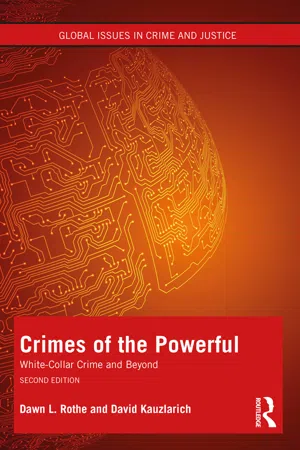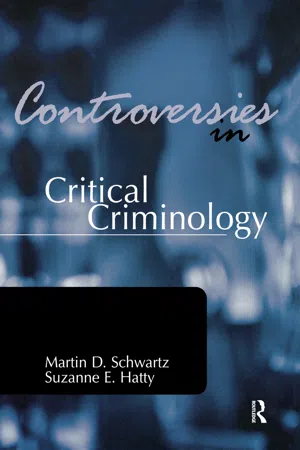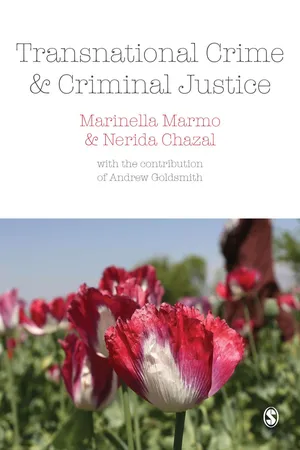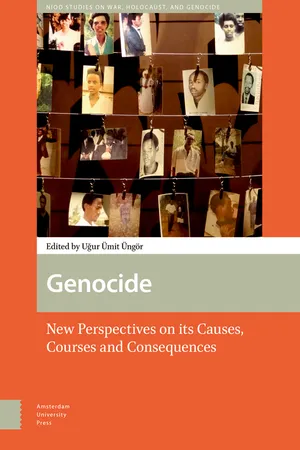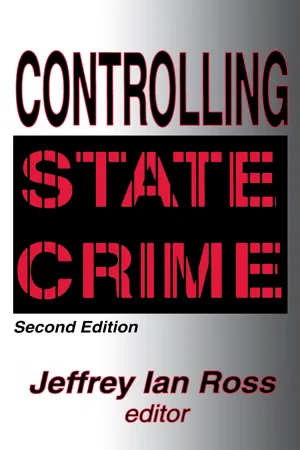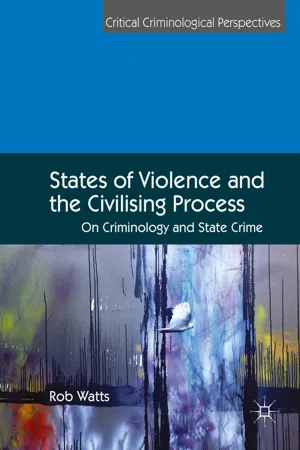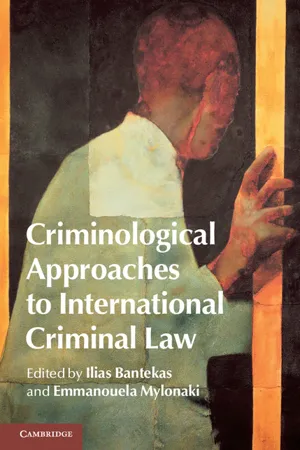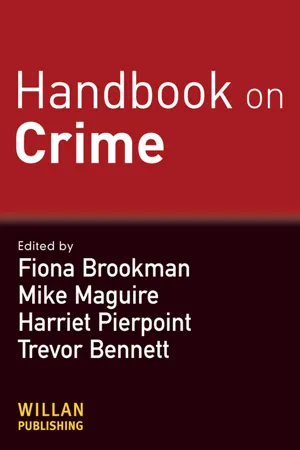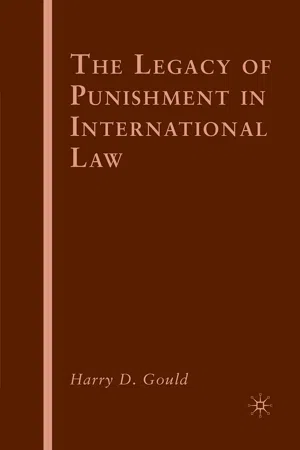Social Sciences
State Crimes
State crimes refer to illegal actions committed by a government or its representatives, often in violation of human rights or international law. These can include acts such as torture, genocide, or war crimes. State crimes are often controversial and can have significant social, political, and legal implications.
Written by Perlego with AI-assistance
Related key terms
1 of 5
9 Key excerpts on "State Crimes"
- eBook - ePub
Crimes of the Powerful
White-Collar Crime and Beyond
- Dawn Rothe, David Kauzlarich(Authors)
- 2022(Publication Date)
- Routledge(Publisher)
Chapter 7 State CrimeDOI: 10.4324/9781003124603-7State Crimes, sometimes referred to as government, wholesale, or regime crimes, can be defined as an act or actions (commission) or failure to act (omission) by actors within the state that result(s) in violations of domestic and international law, human rights broadly, or systematic or institutionalized harm of its or another state’s population in the name of and for the benefit of the state, regardless if there is or is not self-motivation or interests at play. This recognizes independent agency, the organizational context of the political apparatus, and lack of action as well as direct and indirect perpetration. This definition also includes social, cultural, political, and economic harms not “criminalized,” and recognizes the systematic or institutionalized component. Crimes and harms committed by states include, but are not limited to:forced displacement; torture; political assassinations; war crimes; illegal war; illegal occupations; human rights violations; genocide; crimes against humanity; denial of due process; state-sponsored cybercrime; general oppression; arms sales; structural violence; overt and covert surveillance; obstruction; bribery; labor exploitation; violence against women; human trafficking; state propaganda and misinformation campaigns; forced sterilization; perpetuation and institutionalization of classism, racism, sexism; treatment and policies targeting “illegal” immigrants and refugees; treatment and policies targeting the homeless; treatment and policies targeting specific religious groups; and denial of basic sustenance.These can be thought of as part of a continuum, from the subtle to the obvious to the public. Students and readers might wonder how some of these harms, such as denial of basic sustenance or lack of healthcare, are State Crimes. Consider that the justification for a government/state is to protect and provide for its citizenry. This is a very paternalistic concept, but it is a component of states’ legitimacy to govern. States’ failures to uphold this “contract,” or action in direct opposition to it, results in State Crimes and harms. Consider also that State Crimes include the harming of the environment through policies and failures to address climate change or nuclear weapon waste, the environmental impact of war, and the environmental harms that result from ignoring major infrastructural defaults and deterioration. Given the number of states combined with the crimes and harms we note above, it can often feel overwhelming. Consider Box 7.1 - eBook - ePub
- Martin Schwartz, Suzanne E. Hatty(Authors)
- 2014(Publication Date)
- Routledge(Publisher)
on behalf of the state, not for the benefit of the individual state official. Even though it is obviously true that any State Crimes must be carried out by people—state officials or their underlings—if the crimes are carried out to advance state interests, or in the name of the state, are only possible through use of the resources of the state, and reflect norms and values that have developed within the state (or some branch of the state), then we have state crime. Society is more than the sum total of its parts. This is also true of state organizations; they have cultures and structures which shape decisionmaking. It is therefore instructive to view state crime within its larger social contexts. To speak of state crime, then, is certainly not to deny or downplay the personal responsibility of individual state officials; rather, it acknowledges that such crime cannot be fully understood solely in terms of the actions of humans.The second critical part of the definition is that there is no requirement that a "law" be broken in order to identify a state crime. One of the hallmarks of critical criminology is its rejection of a purely legalistic definition of crime. Indeed, most critical criminologists subscribe to the view that the violation of domestic criminal law is but one way to define crime. Other ways to define state crime include the violation of human rights, principles of self-determination, international law, and regulatory and administrative laws. States can also be said to be engaged in crime if they refuse to alleviate avoidable human suffering, pain, and exclusion. As we shall discuss later, this dimension of the definition of state crime is especially controversial.Several types of state crime can be identified. A criminal state is one whose central purpose is a criminal enterprise, such as a state policy of genocidal action. In the twentieth century it was arguably most widely applied to Nazi Germany (as we discuss later), although many other states have been characterized as criminal states as well (e.g., Hussein's Iraq and Milosevic's Serbia). There is also the repressive state, which engages in a fundamental denial of basic human rights (e.g., totalitarian dictatorships in many parts of the world, and the apartheid South Africa as a classic, historical case); the corrupt state, where the state is used as an instrument to enrich its leadership (e.g., the Phillipines under Marcos, or Indonesia under Suharto); and the negligent state, - eBook - ePub
- Marinella Marmo, Nerida Chazal(Authors)
- 2016(Publication Date)
- SAGE Publications Ltd(Publisher)
4 ) we have seen how many different groups, organizations, individuals and states now operate via fluid, dispersed networks that constitute a complex global order. Through the growth in the number of state-activities watchers, the harm caused by the state is more under scrutiny, and states are more likely to be held accountable in different ways. International standards of values and rights crystallized in conventions, treaties and national and supranational courts’ rulings have contributed to form a new conscience towards the role and functions of the state.Definition
While there is no single and accepted definition of State Crimes (Matthews & Kauzlarich 2007), we can consider, for the purposes of this chapter, the working definition offered by Kramer and Michalowski (2005, pp. 447–448):State crime is any action that violates public international law, international criminal law, or domestic law when these actions are committed by individuals acting in official or covert capacity as agents of the state pursuant to expressed or implied orders of the state; or resulting from state failure to exercise due diligence over the actions of its agents.The advantage of embracing this definition is that it complies with a general model of criminal liability: the responsibility for criminal offences is personal rather than collective. In fact, the ‘state’ is a rather abstract concept; who is the ‘state’? The answer may vary, to include the government, parliament and state police as a collective entity, but also the prime minister or president as individuals although acting officially to address a function of the state. The statutory individuality of criminal liability is insufficient to embrace the several forms of collective criminal responsibility and, particularly, to apply and enforce this responsibility to the state. That is why Kramer and Michalowski’s (2005) definition refers to individuals or agents: this definition engages with the legal-procedural concept of criminal liability. - No longer available |Learn more
Genocide
New Perspectives on its Causes, Courses and Consequences
- Ugur Üngör(Author)
- 2016(Publication Date)
- Amsterdam University Press(Publisher)
16 See, for example, the International State Crime Initiative (http://statecrime.org/), as well as Penny Green and Tony Ward, State Crime (London: Pluto Press, 2004). STATE DEVIANCY AND GENOCIDE 89 and also that the defin ition of aggression itself is contested. 17 The State Crimes article was deleted from the final draft largely because consensus could not be achieved on State Crimes. Several potential problems arise with regard to State Crimes. First, there are no adequate institutional mechanisms for the investigation and deter-mination of State Crimes. 18 State sovereignty is a signif icant impediment to the creation and functioning of such a mechanism, as is the lack of a means of compelling the cooperation of states under investigation (though fact-find ing commissions created under Chapter VII of the UN Charter could be one such mechanism). There is also a need for completely neutral institutions capable of conducting investigations free from the taint of political interference in the judicial process. Second, if states are to be treated in a matter analogous to individuals, then there would be an expectation that the system respect basic due process obligations (enshrined in numerous human rights instruments); such a system would need to have a prosecuting agency, complaints systems, and rules of procedure and evidence. 19 Third, it would be unclear which sanctions might be applied to states. If State Crimes were true crimes with criminal responsibility, then penal sanctions would be appropriate (as opposed to typical civil sanctions such as compensation), yet a state, by defin ition, cannot be subject to penal sanctions. States can, however, be punished through other means such as fines and the confiscat ion of property. The desirability of such punitive measures in the context of post-violence peacebuilding is questionable, yet funds from fines may be used to ensure that victims receive assistance. - eBook - ePub
- Jeffrey Ross, Jeffrey Ian Ross(Authors)
- 2017(Publication Date)
- Routledge(Publisher)
Second, to overcome the implications of the definitional and practical problems embedded in a concept of “state crime,” including international enforcement, I outline some forces that provide a philosophical basis for a circumvention of these problems. Third, I describe situations in which human rights procedures, not criminal proceedings, have effectively addressed normatively criminal acts by violative states. 3 Finally, I discuss existing formal legal and human rights-based international developments and instruments which may eventually form part of a comprehensive approach to curtail state actions that are both crimes and human rights violations. These approaches are useful in themselves and could also serve as complementary strategies if an international criminal tribunal were eventually established. The Identification of International Criminals Rather than hold states criminally responsible for international criminal acts, the trend in international criminal law since World War II has been the opposite: to hold individuals internationally accountable for wrongful acts, even if state governments are thought to be culpable. 4 States as Juridical Subjects: Can States Commit Crimes? There are clear doctrinal constraints on the use of international law to deal with crimes committed by states. As a result, states have not been subject to prosecution for their criminal actions by international law (Munch, 1986:127). The doctrine of sovereignty is the principal tenet of international law, and politically constructed entities identified as sovereign states are its primary focus (MacLean, 1989). 5 The legal rights and duties of states are predicated on the doctrine of sovereignty, according to which states are independent and have an equal status as participants in the international forum. As such, international law is comprised of rules which states agree will be valid - eBook - ePub
States of Violence and the Civilising Process
On Criminology and State Crime
- Rob Watts(Author)
- 2016(Publication Date)
- Palgrave Macmillan(Publisher)
4 Here I will suggest it is distinctly puzzling. I will say more about this and suggest how and why this has come about in the next chapter. Let us start with Cohen who sets out to establish whether we can even think about state crime, and if so how and why.Cohen on Crimes of the State
If we cannot afford to let governments define what is criminal, what other grounds are there for saying that what states sometimes do comes under this category? We get some insight into the problems created when criminologists cling to certain conventional ideas like the one that has long animated the very idea of a social science, the Enlightenment conception of a mode of inquiry not dependent on religious or ethical ideas. This is what happens when Cohen (1993 : 97–100, 2000) tries to spell out what is properly criminal about crimes of the state.Cohen addresses Herman and Julia Schwendinger’s attempt to move beyond the narrow juristic idea of crime as whatever the law says it is, and so enable criminologists to engage with state crime. The Schwendingers stated that the best way to do this was to focus on those actions that caused social injury or harm. They argued that what made activities by the state into crimes was ‘the harm done to basic human rights by state actions’. In effect they are saying that ‘Any person, social system, or social relationship that denied or abrogated basic rights is criminal.’ Basic rights include the right to racial, sexual and economic equality. They are basic rights because ‘there is so much at stake in their fulfilment’. As they explained:All persons must be guaranteed the fundamental prerequisites for well-being, including food, shelter, clothing, medical services, challenging work, and recreational experiences, as well as security from predatory individuals or repressive and imperialistic social elites … these material requirements, basic services, and enjoyable relationships are not to be regarded as rewards or privileges. They are rights! (1970 : 148)As they put it:It can be stated, in light of the previous argument, that individuals who deny these rights to others are criminals. Likewise, social relationships or social systems which regularly cause the abrogation of these rights are also criminal. If the terms imperialism, racism, sexism and poverty are abbreviated signs for theories of social relationships or social systems which cause the systematic abrogation of basic rights, then imperialism, racism, sexism, and poverty can be called crimes according to the logic of our argument. (1970 - Ilias Bantekas, Emmanouela Mylonaki(Authors)
- 2014(Publication Date)
- Cambridge University Press(Publisher)
The importance of this sub-disciplinary focus has been confirmed with startling power over the past five years. Indeed, we have witnessed epoch defining uprisings in the Middle East and North Africa that have cen- sured criminal despots and sparked transformative change. Investigative organs such as Wikileaks have shone disinfecting light on the inner sanctums of state power. At the same time the Occupy movement has brought into focus the corrosive link that exists between governments and the finance industry. Indeed, following a period of history that saw the freedom of states and corporations expand exponentially – facilitat- ing a range of harmful practices – social movements are attempting to reel in excesses of power by championing and operationalising a greater range of normative restraints. State crime studies is well positioned not only to understand these social exchanges, but also to inform them. To that end, state crime studies has not, and cannot, confine itself to the academy. 88 Its subject matter demands that scholars immerse themselves within different local, national and international currents of resistance, both in order to research state crime and to remedy it. 89 Accordingly, state crime studies has the ability to tell us about how state crime is enacted and, rather critically, experienced and resisted. The insights and conclusions this gen- erates has and will continue to be the most distinctive mark of state crime studies, which shall make it valuable both as a field, alongside others, and as a partner in emancipatory forms of social change. 88 See Grewcock, above note 23; R. C. Kramer, R. Michalowski and W. J. Chambliss, ‘Epilogue: Toward a Public Criminology of State Crime’, in W. J. Chambliss, R. Micha- lowski and R. C. Kramer (eds.), State Crime in the Global Age (Cullompton: Willan Publishing, 2010) at 247–61. 89 Lasslett, ‘Power, Struggle and State Crime: Researching through Resistance’, above note 46. 92 lasslett- eBook - ePub
- Fiona Brookman, Mike Maguire, Harriet Pierpoint, Trevor Bennett(Authors)
- 2010(Publication Date)
- Willan(Publisher)
This paper will be more useful to students who become familiar with the two concepts which underpin this discussion: the concept of state crime and the (much earlier) concept of social harm. A third concept, that of the global state, has its roots in Marxist theory of the 1970s rather than in criminology.Stan Cohen first developed the concept of ‘crimes of the state’ in 1993, a concept which has been elaborated most notably by Green and Ward (2004) and again by Green (2008). The discussion turns on the distinction between crime and deviance, and the presence or absence of a superordinate political capacity to define the actions of states as criminal, that is to say a law-making capacity. Key texts are Cohen’s (1993) ‘Human rights and crimes of the state: the culture of denial’, Green’s (2008) ‘Women and natural disasters: state crime and discourses in vulnerability’ in M. Cain and A. Howe (eds). See also Green and Ward’s (2004) State Crime: Governments, Violence and Corruption.The criminological concept of social harm was developed by Edwin Sutherland, whose work is cited in the text and references. A valuable recent discussion and elaboration of the concept can be found in the editorial Introduction to Hillyard et al. (2004) Beyond Criminology: Taking Harm Seriously. In this text harm is pegged definitionally to the experience of victims. The difference between this and the definition of Sutherland (1948) and, much later, of Cain and Howe (2008) is between those who seek a legal definition of harm, however broadly ‘legal’ may be defined, and those who argue that harms are best identified and defined by the victims. Green and Ward’s work, defining social rather than legal definitions of harm as deviance even when a state is the perpetrator, offers a third option. This is an important debate between scholars who all agree, as Hillyard et al. so cogently put it, that ‘much harm is the wreckage of neo-liberal globalisation’ (Hillyard et al - H. Gould(Author)
- 2010(Publication Date)
- Palgrave Macmillan(Publisher)
We must analyze whether this trope can support the weight of this attribution. A more strictly Positivist argument for the acceptance of the state crime as a legal category has been offered by Nina Jørgensen, who has suggested two possibilities. Because cor- porate crime and criminality are accepted so widely, they may qualify as general principles of law, and by analogy, the state as a corporate actor can likewise be held criminally liable for any acts stipulated to be unlawful. Alternately, she suggests that state practice indicates the acceptance of state criminal responsibility and is thus indicative of “an emerging category of customary international law.” 8 The second of these sugges- tions must be evaluated empirically, but certainly the decision not to adopt the category on the occasions it has been dis- cussed must count as damning evidence against her assertion of a customary basis. Her first suggestion, resting on an analogy 112 ● The Legacy of Punishment in International Law with corporations, is more promising, and relates in many ways to the general argument introduced previously; however, the following sections will undermine the strength of the analogy. Preliminary Arguments against State Crime as a Conceptual and Legal Category The common argument against the viability of the category of crimes of states rests less on trope and legal fiction and more on a reductive legal Positivism. Current international law as it exists simply does not countenance the concept of state crime, and when the issue has come up, the adoption of rules criminalizing certain state behaviors as such has been explicitly rejected. In both the Rome Statute (Art. 25) and the Articles on the Responsibility of States for Internationally Wrongful Acts (Art. 40), international law and the Interna- tional Law Commission in particular have unambiguously held that only individuals (even acting collectively) commit inter- national crimes.
Index pages curate the most relevant extracts from our library of academic textbooks. They’ve been created using an in-house natural language model (NLM), each adding context and meaning to key research topics.
